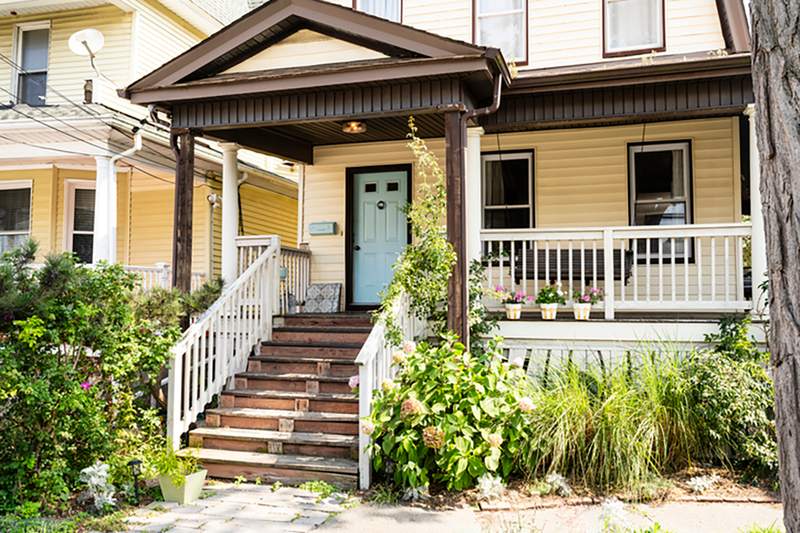As of 2015, a whopping 37% of U.S. citizens rented their homes, rather than owning them. With so many people leasing properties, now is a great time to consider a part-time career as a landlord.
Landlording can be a profitable venture if you can attract tenants and keep them for long periods of time. But there are plenty of challenges to consider as well.
So let’s take a look at the pros and cons of being a landlord.
Why Become a Landlord?
Rental properties can be a fantastic way to obtain wealth in long-term situations. If managed correctly, the money earned from this kind of investment should be passive income, which is income received in regular increments that requires minimal effort from you, the investor. It doesn’t need to be a full-time career path, but it can be a great way to save up for something as big as retirement.
See What You Qualify For
Buy A Home
Discover mortgage options that fit your unique financial needs.

Refinance
Refinance your mortgage to have more money for what matters.
Tap Into Equity
Use your home’s equity and unlock cash to achieve your goals.
Home Is Where You Make It
Deciding on the location of an investment property is an important first step for any landlord. Before investing in that four-bedroom townhouse with a view, you should consider the neighborhood, the school district, the crime rate and nearby amenities.
You should also take a look at the potential renters for these sought-after cities. For instance, if your investment property is near a university, there’s a good chance your tenants will largely consist of students. While you’ll likely have a greater pool of potential tenants during the school year, the summer months may include large vacancies.
Chris Cook, a landlord and creator of Investing Island, a financial blog, suggests that buyers shoot for the middle of the road when it comes to investment properties.
“I like to buy houses in B class or above neighborhoods,” says Cook, “purchasing homes that are rent ready or only in need of cosmetic changes.”
While these houses will be more expensive than fixer-upper locations, they require less of a time commitment over the life of the investment, which will allow you to reinvest your efforts in other profitable ventures.
Location and quality are incredibly important and will affect your return over the entirety of the investment. In Cook’s opinion, you need to do your homework upfront.
“Do your diligence before you make a purchase,” says Cook. “You make your money when you buy.”
Funding Your Project
There are three basic ways to jumpstart your career in the rental business. The first is to fund the purchase of a rental property yourself, which would make this an excellent investment if you’re successful. Like all investments, few things are certain, so there are other options to mitigate your risks.
A second option is to fund your rental aspirations with a host of ready investors. The economy is picking up, and lots of people are looking for an opportunity to watch their money grow from the sidelines. Cook suggests you reach out to local investors through Meetup or locate an investor group in your state.
The third way is to acquire a mortgage, which minimizes your short-term risk while you’re searching for renters. While there will be interest involved with this option, as long as you’re able to maintain regular tenants, at least a portion of their rental payments should be going toward paying down the mortgage.
By paying rent, they’re building the equity in your investment property. If you’re attempting to put a down payment on an investment property but trying to avoid dipping too deeply into your savings account, consider a home equity loan.
Vacancy
Let’s take a second to think about the perfect tenants. Sure, you want them to be respectful and clean, but first and foremost, they need to have a good, reliable job that will assure they can continue paying rent.
In many situations, a good education helps provide this sort of stability, so you should consider this demographic when you’re creating a marketing campaign. Yes, marketing. You don’t have to run an ad agency to sell yourself.
Online posts that display your rental should be well written, informative and properly peppered with helpful photographs. There are few things worse than investment properties that are advertised with limited, fuzzy pictures (like the bird’s-eye view from Google Maps) or, worse, no pictures at all.
You also want to attract buyers who do their research, so provide them with a sufficient amount of information. Quantity is often just as important as quality in these situations, so when you create a post for your rental, display it on a wide variety of websites.
Picking the right tenant is an important step as well. You should create your own screening process to check credit, criminal history and employment. Also take the time to call the potential tenants’ previous landlords for references. Old landlords have been in your shoes before, so call them up and swap war stories. It’ll help you in the long run.
Rent
A good rule of thumb is to make the rental amount 1% of the home’s total value. So if you purchased the home for $100,000, the rent would be close to $1,000. This amount should fluctuate between 0.8% for less expensive properties and 1.1% for more expensive ones, but you should try to stay in this “Goldilocks zone.”
Hugging the 0.8% to 1.1% range provides a nice buffer for the times when tenants skip out of town or the freezer decides to melt ice instead of freezing it. The rest of the rent should go toward paying the mortgage payment, paying for utilities (if you’re not having your tenants do that), paying property taxes and, finally, putting money back in your pocket.
Before slapping a number on your rental, you should also consider other rental properties in the area. It’s a balancing act that requires a lot of forethought. To make it easier on yourself, check out Rentometer, which will compare your price to other local listings.
View Your Refinancing Options
See recommended refinance options and customize them to fit your budget.
Consider Getting Landlord Insurance
When becoming a landlord, it’s important to ask your insurer about a landlord insurance policy.
According to Bob O’Brien, vice president of Noyes Hall & Allen Insurance in South Portland, Maine, “Coverage from a basic landlord policy isn’t quite as broad as a homeowners policy, but it includes big risks like fire, wind, theft and ice damage.”
“Expect to pay 15% to 20% more for landlord insurance than you did for homeowners insurance,” says G.M. Filisko, an attorney and award-winning writer. “In recent years the average cost of homeowners insurance was $822 a year. Tack on 20%, and that would put the average annual premium on landlord insurance at about $986.”
Maintenance
If you can’t find your way around a Home Depot, you might consider hiring a maintenance team to do the work for you. Many landlords take advantage of this, figuring that their time is better spent elsewhere.
Cook is no exception, having a team on hand to take care of repair issues as they happen. For instance, he recently had an HVAC unit go out at one of his properties, and with one call, he had an electrician dispatched to fix the issue, with nothing more needed from him.
According to Cook, “Real estate can be made easy if you can set up a good system.”
Caring for the Client
Speaking of systems, your investment property should be a well-oiled machine. You should have a plan in place to handle everything from the lease agreement to repairs to the way payments are made.
Fortunately for you, several of these systems have already been put in place, so you don’t need to reinvent the wheel. In the case of lease agreements, there are templates available online.
Paying rent is something you might consider automating as well. Accepting checks and money orders can be a real annoyance for both the renter and the landlord. And cash has a way of getting lost, so leave all of these ancient methods behind. Online services, such as Cozy, offer products that allow funds to be paid between lessee and leaser.
The Financial Perks
It may sound like a great deal of effort and risk, but done correctly, leasing houses or apartments is an excellent way to produce cash over the course of your life.
While results vary, an organized landlord can produce a significant amount in gains. Cook earns anywhere between 15% and 20% a year on his investment, making his work in the industry very profitable. What Cook likes about investing in rental properties is the ability to maneuver the odds in his favor.
“You can control real estate more than you can control a stock price,” says Cook. “I can go in and update a kitchen to force rental or price appreciation, whereas I cannot meaningfully force appreciation of the Cola-Cola Company, no matter how many sodas I try to purchase.”
Tax Benefits for Landlords
During tax season each year, keep in mind some of the tax benefits of being a landlord. According to Stephen Fishman, J.D., “interest is often a landlord’s single biggest deductible expense.”
Along with interest, you also get back the cost of real estate through depreciation. Fishman says, “This involves deducting a portion of the cost of the property over several years.”
And the costs of repairs in the year they occur are deductible in rental properties. Fishman’s examples of repairs include repainting and fixing gutters, floors and leaks.
With local and long distance travel, landlords get a deduction for driving.
“When you drive to your rental building to deal with a tenant complaint or go to the hardware store to purchase a part for a repair, you can deduct your travel expenses,” says Fishman. “However, you can’t deduct the cost of travel you do to improve your rental property – these expenses must be added to its tax basis and depreciated over many years.”
You can also get a tax deduction if your rental property is damaged or destroyed – this is called casualty losses. However, you might not be able to deduct the entire cost of damage.
“How much you may deduct depends on how much of your property was destroyed and whether the loss was covered by insurance,” says Fishman.
Explore more tax benefits that you can take advantage of by being a landlord.
Weigh the Benefits and Risks
Landlording can be a dangerous game if you don’t play carefully. Forethought is the most important step to the entire process, so you should take the time to think about the different variables involved with rental properties.
With that said, if you wait too long, you might miss out on your chance to invest.
“Don’t be afraid to get started,” says Cook. “You will make mistakes, and you will learn from them. However, if you get started, you are ahead of the game. Most people only dream about investing and never get started.”
Do you have more questions about becoming a landlord? Let us know in the comments below!
See What You Qualify For
You can get a real, customizable mortgage solution based on your unique financial situation.

Patrick Chism
Born and raised on a farm in the Ozarks, Patrick Chism has a knack for making the best out of the worst situations. Where others see flooded farmland, he sees lakefront real estate. Where others see an infestation of bees, he sees free pollination and an upstart honey shop. Patrick’s articles will help you make the most out of the least, maximizing your returns while keeping a close eye on the wallet. When he’s not writing, Patrick likes hiking, gardening, reading and making healthy foods taste like unhealthy foods.












